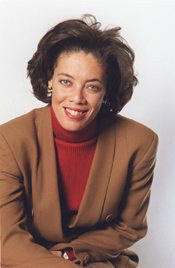Ginger Thompson Q&A

Why Purdue?
The fact is, I sort of chose Purdue on a whim. And it almost did me in.
Purdue people/classes
To me the most difficult part of the transition was giving up my dream.
In high school, I had been editor of the yearbook, and loved languages and writing. But I came from a poor family who encouraged me to put financial stability before intellectual passions. A technical degreed seemed, in their view, to offer more promising professional possibilities than a liberal arts degree. So I decided to study computer technology.
The toll was almost immediately apparent. In my freshman year, I was so swamped struggling to learn computer programming that I barely had time to eat right. I developed
a severe bout of anemia, and had to spend days in the hospital having blood transfusions.
Friends and family worried I had taken on more than I could handle, and some even suggested I should consider returning home. I was determined to make it at Purdue, and thanks to journalism professor named Dave Nelson, I also recovered my dream.
I took Dave’s journalism class my sophomore year. By my junior year, Pat Kuhle also took me under his wing. I had quit computer technology, enrolled in liberal arts with a focus on journalism, and became managing editor of The Exponent.
Most fulfilling professional accomplishment
Perhaps the work I love most is a series of stories I co-wrote with another reporter. The series, published in 1995, allowed my colleague, Gary Cohn, and me the rare opportunity to work for more than a year investigating American misdeeds in a tiny Central American country few people cared about.
The story involved months of reporting from Honduras. Our stories exposed the United States’ role in the atrocities committed against Honduran people and the damage done to that country’s effort to become a functioning democracy.
Tidbit of wisdom to students
As for pearls of wisdom, I’d tell today’s graduates, not to be afraid to make mistakes, because safe roads generally take you nowhere.
Education
BA 1986, Communication, Purdue University
J.B. and Maurice C. Shapiro Graduate Fellow, The Elliott School of International Affairs, George Washington University
Professional History
National Correspondent, Washington Bureau, New York Times
Bureau Chief, Mexico City, New York Times
Reporter, New York Times
Foreign/National Correspondent, Chicago Tribune
Latin America Correspondent, Baltimore Sun
National Correspondent, Baltimore Sun
Reporter, Los Angeles Times
Honors/Awards
Pulitzer Prize, Winner, “How Race is Lived in America”
Pulitzer Prize, Finalist for Gold Medal for Public Service
Maria Moors Cabot Prize
Selden Ring Award, USC School of Journalism
Overseas Press Club Award, Human Rights Reporting
InterAmerican Press Association Award